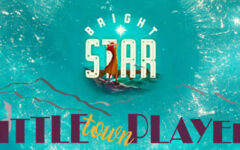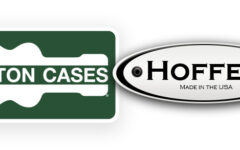 Sometime soon, the powers that be at IBMA will sit down to determine who to add to the Bluegrass Hall of Fame. Hazel Dickens’ name will come up. It always does. And the usual arguments will come up, too. They always do.
Sometime soon, the powers that be at IBMA will sit down to determine who to add to the Bluegrass Hall of Fame. Hazel Dickens’ name will come up. It always does. And the usual arguments will come up, too. They always do.
Something about how Hazel was folk and was never really bluegrass.
But here’s the other side of that argument. Hazel Dickens, who died Friday at 75, was a bluegrass pioneer. No Hazel Dickens singing gritty songs about women and blue collar workers? It’s very easy to imagine no Alison Krauss, Claire Lynch, Rhonda Vincent or Missy Raines either, at least as band leaders.
But this isn’t about politics. This is a tribute to a first-rate storyteller, whose music inspired generations of women and men and whose fight-for-the-underdog role will live on in her songs. Hazel left West Virginia, making her name in music in Baltimore and Washington, but West Virginia never left Hazel.
Raines says she is grateful for Hazel, the trailblazer. “Hazel paved the way for us all,” she told me. “She was a role model and she set a high mark of integrity, to which we all aspire.”
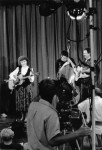 But Raines says she was first drawn to Hazel’s brand of music when the West Virginia native sang for the coal miners of Appalachia. “As a native West Virginian, I remember feeling that I could hear the honesty in her voice,” she said. “And sincerity and grit, the kind of grit that sustains you. I felt like she was giving those people a voice. She was singing for those who couldn’t. That meant a great deal to me.”
But Raines says she was first drawn to Hazel’s brand of music when the West Virginia native sang for the coal miners of Appalachia. “As a native West Virginian, I remember feeling that I could hear the honesty in her voice,” she said. “And sincerity and grit, the kind of grit that sustains you. I felt like she was giving those people a voice. She was singing for those who couldn’t. That meant a great deal to me.”
Rhonda Vincent, too, recalled Hazel as a path clearer.
“She was always encouraging and presented a perfect example of being who you are, through the authenticity of her music,” she said. “I appreciate her support of women in bluegrass music and will miss her very much. We love you, Hazel.”
The news of Hazel’s death, following a rough winter of sickness, hit Todd Phillips especially hard. Phillips, who played bass on a reunion tour featuring Hazel and longtime musical partner Alice Gerrard more than a decade ago, is producing a tribute project, with a star-studded lineup performing Hazel’s songs. Earlier this week, he told me he hoped to wrap up the project, 10 years in the making, in time for Hazel to enjoy. Today, I had the unfortunate task of telling him it wasn’t to be.
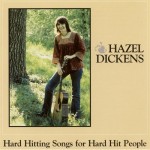 He said he knew that Ken Irwin, head of Rounder Records, had played some of the songs from the project for her, “but I wish she got to hold the final product in her hands.”
He said he knew that Ken Irwin, head of Rounder Records, had played some of the songs from the project for her, “but I wish she got to hold the final product in her hands.”
That project, and Hazel’s first solo project in years, have both been on hold for a long time, for reasons that the label hasn’t explained, and there’s no indication how her death will affect final decisions about the music.
In addition to cuts by Elvis Costello, Emmylou Harris, Claire Lynch and others, Phillips is left with some wonderful memories of an American Songbird.
Phillips recalled the process when he needed to call Hazel to check lyrics. “Phone calls with her were never short.,” he chuckled. “You’d want to check on two words and you’d need to set aside an hour” to hear a story related to the song, perhaps how it came about, or something that happened one time when she performed it.
When he toured with her, he saw a side of Hazel that fans didn’t see. “She was full of funny stories,” he said. In many cases, her friends say, risqué stories. “She told stories on Lester Flatt that I can’t really repeat,” Phillips noted.
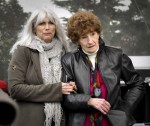 I got a glimpse of this side of Hazel last year at IBMA, when she joined Peter Rowan to present two awards at the IBMA gala. Rowan asked if Hazel remembered the rush she used to get from standing on stage. She quickly fired back, “I still have that rush, standing next to you.”
I got a glimpse of this side of Hazel last year at IBMA, when she joined Peter Rowan to present two awards at the IBMA gala. Rowan asked if Hazel remembered the rush she used to get from standing on stage. She quickly fired back, “I still have that rush, standing next to you.”
I was looking forward to chatting with Hazel again last weekend, when she was awarded the D.C. Bluegrass Union’s Washington Monument award. But she was too ill to attend the festival and claim her prize.
Lynn Morris recorded Hazel’s song, Mama’s Hands, which won IBMA song of the year, and her husband Marshall Wilborn often played bass when Hazel toured in recent years. The pair accepted the Washington Monument award for Hazel at the DCBU festival. “Hazel was a true and dear friend,” said Lynn in a recent email. “Her songs, and the way she delivered them, were, in the deepest, truest sense, original. It’s our treasure to have known her and shared so many wonderful times.”
So like everybody else who cherished Hazel, I’m left with the memories. And the music. And a sense that, for a while, we were in the midst of someone special.
Hazel Dickens had soul.
And Hazel Dickens had a bluegrass heart, no matter what the gatekeepers at the IBMA Hall of Fame may say.



